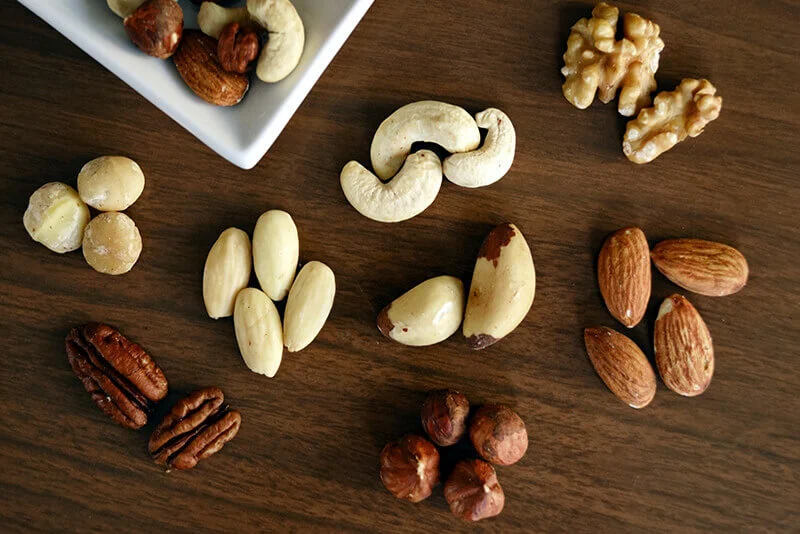What Nuts Can Dogs Eat? Dogs have a wider variety of dietary options than many people assume, including some nuts that can be safely eaten. Some common nuts that can be eaten by dogs include cashews, peanuts, pistachios, and walnuts.
While it’s always best to consult your veterinarian before giving your dog any new food, on occasion these nuts can make for an enjoyable and nutritious addition to their diet.
Can dogs eat nuts?

It is best to avoid feeding your dog any kind of nut. This is due to the high amount of fat that they contain, as was previously noted, as well as the fact that it is extremely simple for dogs to suffocate on them. There are a few varieties of nuts that only pose a moderate threat to canines and should only be consumed on an occasional basis.
The ingestion of certain nuts, which are known to be highly toxic to canines, may result in long-term health issues for your canine companion.
Pancreatitis is a condition that can develop in dogs if they consume the incorrect kind of nut. The fact that there is a correlation between a diet high in fat in general and pancreatitis, which is an inflammation of the pancreas in dogs.
Pancreatitis manifests itself with symptoms that are similar to those of poisoning, including nausea, vomiting, diarrhea, tiredness, and loss of appetite. In addition to this, you might notice that your dog walks with a hunched back or that he has a swollen tummy.
Your dog should never be given nuts that have been seasoned or salted in any way.
What nuts can dogs eat?
Cashews
Cashews are a type of nut that many people believe can be consumed by their dog safely. Cashews are a source of both protein and healthy fats, which can be helpful for dogs’ overall health. Additionally, cashews are relatively low in calories and contain few preservatives, so they make a good option for snacks. If your dog is hesitant to eat nuts in general, start with small amounts of cashews and gradually increase the amount over time.
Chestnuts
Chestnuts have a long history as a popular snack for dogs, but are they good for them? Researchers from the University of California at Davis recently published a study that says yes – Chestnuts can be a healthy addition to a dog’s diet. The research team tested the effects of feeding dogs either chestnuts or a control food on their blood lipids (fats) and bone mineral density.
Peanuts
Dogs are able to consume plain peanuts without any adverse effects. Peanuts are actually a type of legume, just like peas and lentils. If you are going to give your dog a few peanuts, you should make sure they are de-shelled first. Also, be sure that the peanut butter you give your dog does not include xylitol, which is an artificial sweetener that is extremely harmful to dogs and has the potential to be fatal for them.
Also Read: Will Baking Soda Neutralize Dog Urine On Grass?
Pecans
Every once in a blue moon, dogs are allowed to eat pecans. Your dog won’t get sick from eating these nuts because they aren’t poisonous. However, they do contain a significant amount of fat, so feed them with caution.
Pistachios
Pistachios, in moderation, are a treat that can be offered to dogs. However, you should now allow your furry friend to eat the shells themselves. Pistachio shells pose an additional risk of choking for your dog and also have the potential to injure its lips or neck.
Walnuts
Walnuts are a delicious and nutritious addition to your dog’s diet. They can provide the perfect balance of vitamins and minerals, as well as antioxidants and other nutrients. In fact, a single ounce (28 grams) of walnuts provides about 6% of the recommended daily allowance of vitamin E, 4% of the iron recommended for adult dogs, and 3% of the potassium required by dogs.
Nuts that dogs cannot eat
Almonds
According to PetMD, they are not technically harmful, thus it is perfectly fine to consume them on occasion. Almonds, on the other hand, are not something that should ever be given to a dog as a reward, according to the American Kennel Club. We recommend staying away from them as much as possible. It’s not the end of the world if your dog picks up an almond from the floor, but you should definitely keep a close eye on him to make sure he doesn’t choke on it.
Brazil nuts
It is not recommended to provide brazil nuts to canines because of the exceptionally high amount of fat that they contain. The fact that Brazil nuts can become stuck in the digestive systems of smaller breeds makes them more susceptible to the dangers that they provide.
Hazelnuts
Hazelnuts are much more like almonds and have a form that makes them particularly dangerous when it comes to choking. Even though you do not need to contact your veterinarian immediately in the event that your dog gets a hold of hazelnut, you should by no means make it a routine to provide them to your pet.
Macadamia nuts
This particular nut is highly dangerous for dogs to consume. They have been linked to symptoms such as tremors, weakness, paralysis, and inflammation of the joints. In the event that your dog eats or chews on macadamia nuts, you should immediately contact your veterinarian to discuss the most appropriate next steps.
Conclusion
In conclusion, if you’re looking for a healthy way to feed your dog protein, fiber, and healthy fats, forget the nuts! There are many healthier ways you can deliver these important nutrients to your dog through food items like meat, eggs, poultry, and fish. So give your furry friend a diet that will not only keep him happy and healthy but also help him live a longer life.

